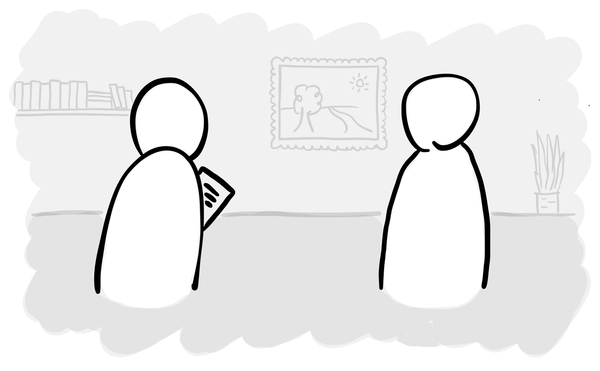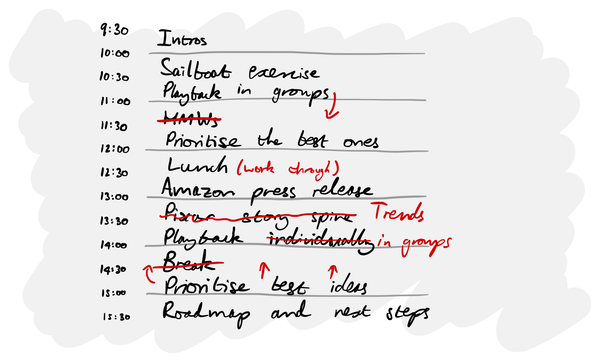Stop asking “can you give me an example of when you…” in job interviews
Why this type of question is flawed and what to ask instead.

There’s a certain type of question that interviewers love to ask candidates:
- Can you give me an example of when you successfully managed multiple priorities?
- Can you give me an example of when you had to work with a difficult stakeholder?
- Can you give me an example of when you led a team through change?
These are classic behavioural questions, based on the idea that past behaviour is the best predictor of future performance. That idea isn’t wrong. In fact, behavioural interviewing can be useful when done well.
But the way these questions are often phrased - vague, open-ended, and reliant on memory recall under pressure - is where things fall apart.
These questions test recall, not competence
These questions may seem reasonable to ask, but in practice you’re asking the candidate to:
- Search their memory for relevant examples across years of experience
- Quickly evaluate and compare them
- Choose the one that best matches your intent
- Structure it into a coherent, persuasive story
- Deliver it fluently while under stress
They need to do this in a few seconds, under pressure.
These questions don’t tell you how someone will perform. They tell you how well they can narrate their career under pressure.
Why they’re hard to answer
Take a question like “Can you give me an example of when you solved a problem creatively?”
Unless you anticipated it and rehearsed an answer in advance, it’s difficult to answer because:
- It’s broad and unspecific, meaning that many memories could qualify. This increases the breadth of the ‘search’ that you have to undertake within your memory.
- It’s easy to answer “When did you last go on a train?” because there is one factual answer.
- It’s hard to answer “What’s the most interesting train journey you’ve ever been on?” because there are many that you would need to recall and evaluate.
- Stress impairs memory retrieval. An interview is a stressful situation and you’re putting the candidate on the spot to recall a memory quickly. They might have plenty of relevant experience, but if they can’t bring it to mind immediately, they’ll come across as underqualified.
We wouldn’t ask this type of question in UX research
There’s a category of mistake in research moderation that you see inexperienced interviewers make: asking a research objective as a direct question.
For example, if your objective is to learn whether people notice and understand discounts on an e-commerce site then you might ask “Did you see the promotion on the homepage?”, but this is flawed because it’s leading.
Instead, you need to be more subtle in your questioning and achieve your objective in a more roundabout way. In this case you might ask them to complete a relevant task (like finding a discounted product) and then follow up by asking what helped them make their decision or what stood out along the way.
So when people interview a candidate and want to know if someone solves problems creatively, asking “Can you give me an example of when you solved a problem creatively?” is the same type of interviewing mistake.
Just as leading questions distort research data, overly open-ended behavioural prompts can distort hiring decisions, rewarding confidence, polish, or preparation rather than substance.
What to use instead
So if you want to know if someone is competent, what should you ask instead?
1️⃣ Ask “how do you…” first and then ask for an example second
Instead of:
“Can you give me an example of when you dealt with a difficult team member?"
Ask:
“How do you typically approach working with colleagues you disagree with?”
This is far easier to answer because it’s not a memory recall challenge. It focuses on process first. If the candidate doesn’t offer an example as part of their response, then you can ask “Can you walk me through a time when this approach worked well?”
Because you’ve got them thinking about this topic with an easier first question, if you do ask them to recall a specific example, it’s much easier as they have had more time to think about it.
2️⃣ Give them a scenario and ask how they’d approach it
A variation on the above, this reveals how someone reasons, without the cognitive overhead of memory retrieval.
Instead of:
“Can you give me an example of when you showed leadership?”
You would ask something like:
“Imagine you are leading a new, unfamiliar team. What steps would you take in the first month to build trust and momentum?”
If you want a specific example from their past, you can always ask, but again this will be easier for them to recall because you’ve given them more time to ponder the topic before putting them on the spot.
3️⃣ A task or case study
Another alternative is to give someone a task to complete or a case study walkthough. These have their own flaws - tasks can be very stressful and case studies can be rehearsed - but they’re not testing someone’s memory recall in the same way and there’s less chance that they’ll completely blank on you.
Try it out
The next time you run interviews, try to do them without any “can you give me an example of when you…” questions and replace these with the alternatives above.
You might be surprised to find that you aren’t any less able to judge candidates’ competency than before.





